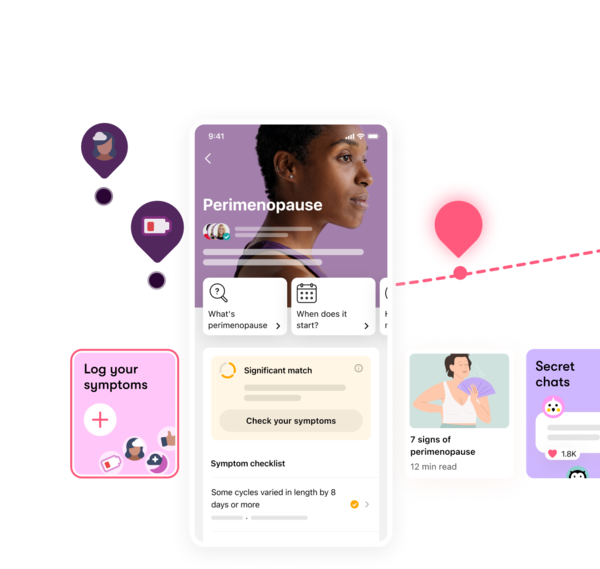You might notice your periods changing during perimenopause. Knowledge is power, so here’s everything you need to know.
-
Tracking cycle
-
Getting pregnant
-
Pregnancy
-
Help Center
-
Flo for Partners
-
Anonymous Mode
-
Flo app reviews
-
Flo Premium New
-
Secret Chats New
-
Symptom Checker New
-
Your cycle
-
Health 360°
-
Getting pregnant
-
Pregnancy
-
Being a mom
-
LGBTQ+
-
Quizzes
-
Ovulation calculator
-
hCG calculator
-
Pregnancy test calculator
-
Menstrual cycle calculator
-
Period calculator
-
Implantation calculator
-
Pregnancy weeks to months calculator
-
Pregnancy due date calculator
-
IVF and FET due date calculator
-
Due date calculator by ultrasound
-
Medical Affairs
-
Science & Research
-
Pass It On Project New
-
Privacy Portal
-
Press Center
-
Flo Accuracy
-
Careers
-
Contact Us
Periods during perimenopause: What to expect


Every piece of content at Flo Health adheres to the highest editorial standards for language, style, and medical accuracy. To learn what we do to deliver the best health and lifestyle insights to you, check out our content review principles.
Do you remember getting “the puberty talk” in health class? When your first period arrived, you hopefully knew roughly what to expect. But the same isn’t always true for perimenopause, the transitional phase before menopause (which you officially reach when you haven’t had a period for 12 months).
Perimenopause generally begins in your 40s but can start as early as your mid-30s. And one of the first signs you might notice is new changes to your period.
If your period has arrived like clockwork all your life — only to start behaving more like a temperamental house guest — you may wonder what’s happening. “If we give young girls puberty talks, we should be giving women peri talks,” says obstetrician and gynecologist Dr. Sameena Rahman from Illinois, United States. She likes to give her patients a heads-up about perimenopause before they get there.
Side note: If you don’t have periods because, for instance, you take hormonal contraception continuously or have had your uterus surgically removed, you’ll still go through menopause transition.
Why do period changes happen in perimenopause?
During perimenopause, your ovaries start producing estrogen erratically, meaning levels can surge very high before dropping dramatically. Progesterone, another hormone produced by your ovaries, gets thrown off-kilter, too. Once you reach menopause, the roller coaster stops, and estrogen levels stay low.
Period changes don’t necessarily mean you’re in perimenopause. And some people have regular periods through to menopause. But if you’re in your late 30s or 40s, and especially if you’re experiencing other symptoms (such as hot flashes and mood changes), perimenopause is something to consider.
What are periods like during perimenopause?
Let’s look at some of those possible period changes you might experience.
Irregular periods
Whether you’ve had a regular cycle all your life or your periods have always been variable, you probably have a baseline of what’s normal for you — especially if you’re regularly tracking them in Flo. Perimenopause can make your periods harder to predict.
In medical terms, “irregular periods” doesn’t just mean they’re out by a day or two. Instead, it’s when the length between cycles (the time between one period starting and the next) consistently varies by more than seven days. For instance, one cycle is 29 days, the next is 40 days, the next is 25, and so on.
One Secret Chats community member described their cycle as “intermittently irregular.” “By that, I mean I will have my usual 26- to 28-day cycle for a few months, and then it will be 38 days. It really freaked me out the first time,” they said.
Longer or shorter cycles
During perimenopause, you might also find that your cycle is longer or shorter than you’re used to.
Two big studies (albeit from the 1960s) found that women in their 40s had an average cycle length of 26 days compared to 29 days for women in their 20s. This isn’t a huge change, but it’s big enough that you’d notice. But know this — if you’re not in your 40s and your cycle lasts an average of 26 days, that’s totally fine and not necessarily a sign of perimenopause.
Dr. Rahman says that in early perimenopause, it’s common to find that periods get closer together. “In later perimenopause, you may find that you have cycles that are spaced out, maybe 60 days apart or longer,” she adds.
Take a quiz
Find out what you can do with our Health Assistant
Longer or shorter periods
The number of days you bleed can also change during perimenopause. A typical length bleed lasts between two and seven days, but for some people in perimenopause, it may sometimes feel like your period is never going to end.
Other times, there might be fewer days of bleeding than what you’ve come to expect. One Secret Chats member said: “For nearly a year, my periods had gone down in length to only lasting about 1.5 to 2 days.”
Heavier or lighter periods
It’s worth noting if you’re into wearing white – your periods might get heavier in perimenopause. Perimenopausal discussions in Secret Chats include “going through a heavy flow tampon in under an hour for the entire day,” “super heavy periods with huge clots,” and even having “to use adult diapers to contain the flow.”
If you’re in the same boat, see a trusted health care provider. They might want to rule out fibroids (noncancerous growths on the muscle of your uterus), polyps (noncancerous growths in the inner lining of your uterus), or other underlying causes. Fibroids and polyps aren’t directly caused by perimenopause, but they become more common during this time. “Heavy, uncontrolled bleeding should be evaluated,” Dr. Rahman says.
You might also experience the opposite extreme — light, intermittent bleeding you barely recognize as a period. Again, if this is you, make an appointment with a health care provider. Your doctor might conduct some tests to determine if your change in bleeding pattern is due to menopausal changes or something else.

Skipped periods
Missing periods are another hallmark of perimenopause because your ovaries may not release hormones in a regular pattern every month as they previously did. It’s not unusual for periods to vanish without a trace and then reappear a few months later.
Remember, you’re not officially in menopause until a full year has elapsed without a bleed. And though it can get harder to get pregnant as menopause approaches, it’s still not totally impossible. So don’t throw out your menstrual products just yet, and use birth control if you are not trying to have a baby!
Painful periods
Unfortunately, some folks deal with especially painful periods during perimenopause. This can be associated with erratic estrogen production or with other conditions like fibroids or adenomyosis (a condition where the lining of your uterus grows into the muscular wall of your uterus) that become more common around this time. If period pain is getting in the way of your life, you definitely shouldn’t put up with it. See your doctor, who can advise on the next steps.
When to see a doctor
Some period changes are a normal part of perimenopause, and you may not need treatment. However, you should always see a doctor if you experience:
- Spotting between periods
- Bleeding during or after sex
- Extremely heavy bleeding (having to change period products every hour) or clots larger than a quarter (that’s about an inch or 25 mm in diameter).
- Bleeding that lasts much longer than usual
- Periods that have become painful or feel worse than before
- Accompanying nausea, vomiting, lethargy, or malaise
- Bleeding after menopause
More generally, Dr. Rahman advises visiting a health care provider if period changes or other perimenopause symptoms impact your quality of life.
Lifestyle changes, such as “keeping an active lifestyle, getting seven consecutive hours of sleep, and eating a balanced diet,” can sometimes help with perimenopausal symptoms, she suggests. Some people find hormone therapy — birth control for perimenopause or menopause hormone therapy — helpful. But always discuss treatment options with your doctor first, she adds.
The takeaway
Perimenopausal periods can be confusing, particularly if you’re used to your body doing one thing and it suddenly starts doing another. But information (and knowing what you might expect) is power.
Keep logging your periods in Flo. Logging can help you spot patterns and learn what’s normal for you. Plus, it creates a handy reference to share with your health care provider if needed.


Hey, I'm Anique
I started using Flo app to track my period and ovulation because we wanted to have a baby.


The Flo app helped me learn about my body and spot ovulation signs during our conception journey.


I vividly
remember the day
that we switched
Flo into
Pregnancy Mode — it was
such a special
moment.
Real stories, real results
Learn how the Flo app became an amazing cheerleader for us on our conception journey.
References
Casper R, F. “Patient Education: Menopause (Beyond the Basics).” UpToDate, 15 Nov. 2022, www.uptodate.com/contents/menopause-beyond-the-basics.
“Perimenopause.” Mayo Clinic, 25 May 2023, www.mayoclinic.org/diseases-conditions/perimenopause/symptoms-causes/syc-20354666.
“Perimenopause.” Cleveland Clinic, my.clevelandclinic.org/health/diseases/21608-perimenopause. Accessed 1 Sep. 2023.
Harlow, Siobán D., et al. “Executive Summary of the Stages of Reproductive Aging Workshop +10: Addressing the Unfinished Agenda of Staging Reproductive Aging.” Climacteric, vol. 15, no. 2, 16 Feb. 2012, pp. 105–14, https://doi.org/10.3109/13697137.2011.650656.
“Irregular Periods.” NHS, www.nhs.uk/conditions/irregular-periods. Accessed 1 Sep. 2023.
Prior, J. C. “Perimenopause: The Complex Endocrinology of the Menopausal Transition.” Endocrine Reviews, vol. 19, no. 4, Aug. 1998, pp. 397–428, academic.oup.com/edrv/article/19/4/397/2530801.
“Menstrual Cycle: What’s Normal, What’s Not.” Mayo Clinic, 22 Apr. 2023, www.mayoclinic.org/healthy-lifestyle/womens-health/in-depth/menstrual-cycle/art-20047186.
“Perimenopausal Bleeding and Bleeding after Menopause.” The American College of Obstetricians and Gynecologists, Oct. 2020, www.acog.org/womens-health/faqs/perimenopausal-bleeding-and-bleeding-after-menopause.
“Dysmenorrhea: Painful Periods.” The American College of Obstetricians and Gynecologists, Dec. 2020, www.acog.org/womens-health/faqs/dysmenorrhea-painful-periods.
History of updates
Current version (07 December 2023)
Published (27 August 2019)
In this article

Track your perimenopause journey in the Flo app
-
Log symptoms and get tips to manage them
-
Learn what to expect with expert-led articles and videos
-
Connect with others who can relate to how you're feeling




